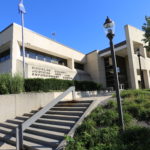Lawrence police officers now carrying — and have already used — nasal Narcan for opioid overdoses
Hours after the first wave of Lawrence police officers were trained to administer nasal Narcan, some of those officers helped save a man’s life with it.
Police were called to a home where a 48-year-old man was unresponsive, and officers were able to quickly determine that he had suffered a drug overdose, Officer Drew Fennelly said.
Officers gave the man a dose of nasal Narcan and, coupled with a follow-up treatment by arriving paramedics, the man became alert within minutes and his life was saved, Fennelly said.
In a newly rolled out initiative, some Lawrence police officers are now carrying nasal Narcan — an emergency drug used to revive people who have overdosed on opioids — for just such situations, Fennelly and the department announced in a recent news release.
“Opioid related deaths have been on the rise nationally over the last several years, and Lawrence is not immune to the effects of the opioid epidemic,” the department said. “One of the most valuable tools in combating opioid related deaths is the drug Narcan, which is a lifesaving drug when administered in the immediate aftermath of an overdose.”
Last week, on May 9, the Lawrence Police Department in conjunction with Lawrence-Douglas County Fire Medical and DCCCA Inc. began a phased implementation of the new Narcan program, according to the news release. The University of Kansas Health System has provided 160 doses of the medication to the police, at no cost to the department, for the implementation phase of the program.
All officers soon will be carrying and trained to use Narcan.
The morning of May 9, the police department trained its first group of officers.
The overdose call happened early that evening in the 1700 block of West 24th Street, Fennelly said.
Beyond emergency interventions, the department said it was committed to working with its partnering agencies to identify ways to combat opioid use and to get treatment to people who are addicted.
Opioids are a class of drugs that include heroin, synthetic opioids such as fentanyl, and pain relievers available legally by prescription such as oxycodone, hydrocodone, codeine, morphine and many others, according to the National Institute on Drug Abuse. An opioid overdose can be reversed with the drug naloxone, the generic form of Narcan, when given right away.
According to the institute, each day more than 115 people die after overdosing on opioids nationwide.
Opioid overdoses increased 30 percent from July 2016 through September 2017 in 52 areas in 45 states, according to the institute. In the Midwest, opioid overdoses increased 70 percent from July 2016 through September 2017.







COMMENTS